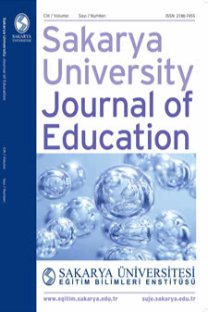The content of elementary and higher education in in 8th - 9th century frankish monasteries
8. ve 9. Yüzyıl frank manastırlarında orta ve yüksek öğretimin içeriği
___
- Barber, J. (2008). The Road from Eden: Studies in Christianity and Culture. California: Academica Press, LLC.
- Bernhardt, J. W. (2002). Itinerant Kingship and Royal Monasteries in Early Medieval Germany, c. 936- 1075 (Vol. 21). Cambridge: Cambridge University Press.
- Carlbach, E. (2011). Palaces of Time. Canada: Harvard University Press. Clark, J. M. (1926). The Abbey of St. Gall as a Centre of Literature and Art. Cambridge: Cambridge University Press.
- Copleston, F. (1950). History of Philosophy (Vol. 2). New Jersey: Paulist Press.
- Cordasco, F. (1976). A Brief History of Education: A Handbook of Information on Greek, Roman, Medieval, Renaissance, and Modern Educational Practice (No. 67). Rowman & Littlefield.
- Corradini, R., Diesenberger, M., Reimitz, H. (2003). The Construction of Communities in the Early Middle Ages: Texts, Resources and Artifacts. Leiden: Brill.
- Cross, F. L., & Livingstone, E. A. (2005). The Oxford Dictionary of the Christian Church. New York: Oxford University Press.
- Cunningham, L., Cunningham, L. S., & Reich, J. (2013). Culture and Values : A Survey of the Western Humanities (8th ed.). Thomson Wadsworth
- Dales, R. C. (1973). The Scientific Achievement of the Middle Ages (Vol. 57). University of Pennsylvania Press.
- Deanesly, M. (1969). A History of the Medieval Church: 590-1500. London: Routledge. De Jong, M. (1996). In Samuel's Image: Child Oblation in the Early Medieval West (Vol. 12). Leiden: Brill.
- Ferzoco, G., & Muessig, C. (Eds.). (2001). Medieval Monastic Education. London/New York: Leichester Univesity Press
- Greene, J. P. (1992). Medieval Monasteries. London: Continuum International Publishing Group.
- Grotans, A. A. (2006). Reading in Medieval St. Gall. Cambridge: Cambridge University Press.
- Hildebrandt, M. M. (1992). The External School in Carolingian Society (Vol. 1). Leiden: Brill.
- Jaeger, S. (1994). The Envy of Angels: Cathedral Schools and Social Ideals in Medieval Europe, 950-1200. Univ. of Philadelphia: Pennsylvania Press.
- Lerner, F. (2009). The Story of Libraries: From the Invention of Writing to the Computer Age. New York: Continuum International Publishing Group.
- McKitterick, R. (Ed.). (1994). Carolingian Culture: Emulation and Innovation. Cambridge: Cambridge University Press.
- (1995). The New Cambridge Medieval History II c.700-c.900. Cambridge: Cambridge University Press.
- Moffett, M., Fazio, M., & Wodehouse, L. (2003). A World History of Architecture. London: Laurence King Publishing.
- Rashdall, H. (2010). The Universities of Europe in the Middle Ages: Salerno. Bologna. Paris. Cambridge: Cambridge University Press.
- Riché, P. (1978). Daily Life in the World of Charlemagne. University of Pennsylvania Press.
- Robinson, D. (2010). Ancient Paths: Discover Christian Formation the Benedictine Way. Massachussetts: Paraclete Press.
- Sullivan, R. E. (1995). The Gentle Voices of Teachers: Aspects of Learning in the Carolingian Age. The Ohio State University Press.
- Taylor, A. L. (2013). Epic Lives and Monasticism in the Middle Ages, 800-1050. New York: Cambridge University Press.
- Verhulst, A. (2002). The Carolingian Economy. Cambridge: Cambridge University Press.
- ISSN: 2146-7455
- Yayın Aralığı: 3
- Başlangıç: 2011
- Yayıncı: Sakarya Üniversitesi Eğitim Bilimleri Enstitüsü
Kitap Tanıtımı: Geç Osmanlı ve Erken Cumhuriyet Dönemlerinde Okumayı Öğrenmek
Öğretmen Adaylarının Bilimin Doğası İnanışlarının Tespiti: Bir Ölçek Geliştirme Çalışması
Elaboration on production of ıdioms and ıdiomatic expressions by esl learners
8. ve 9. Yüzyıl Frank Manastırlarında Orta ve Yüksek Öğretimin İçeriği
Relationship between Occupational Professionalism of Teachers and Their Job Satisfaction
Yahya ALTINKURT, Kürşad YILMAZ
The content of elementary and higher education in in 8th - 9th century frankish monasteries
Using body language to make and maintain a solid first ımpression and to decode students' behaviours
Öğretmenlerin mesleki profesyonelliği ile iş doyumları arasındaki ilişki
Yahya ALTINKURT, Kürşad YILMAZ
İngilizce'yi Yabancı Dil Olarak Öğrenen Öğrencilerin Deyimleri Kullanmalarının Değerlendirilmesi
